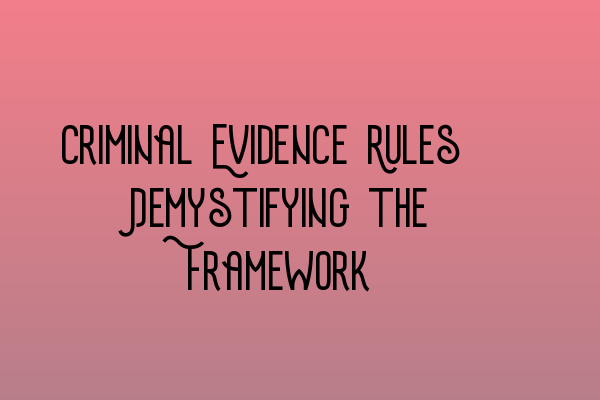Criminal Evidence Rules: Demystifying the Framework
Welcome to the SQE Criminal Law & Practice Law UK blog! In this article, we will delve into the intricacies of criminal evidence rules and demystify the framework governing them. Understanding the rules surrounding the admissibility and exclusion of evidence is crucial for legal professionals, and this comprehensive guide will equip you with the knowledge you need to navigate this complex area of law.
The Importance of Criminal Evidence Rules
Effective criminal evidence rules are the cornerstones of a fair and just legal system. These rules ensure that evidence presented in court is reliable, relevant, and obtained lawfully. By establishing a framework for the admissibility and exclusion of evidence, criminal evidence rules protect the rights of individuals accused of crimes and promote trust in the criminal justice system.
To gain a better understanding of criminal evidence rules, it is crucial to explore key concepts such as hearsay, relevance, expert evidence, and privilege. These concepts shape the criteria for admitting or excluding evidence in criminal proceedings. If you want to test your knowledge on criminal evidence rules, check out our SQE 1 Practice Exam Questions that will help you prepare for the SQE 1 exam.
Admissibility and Exclusion of Evidence
One of the fundamental considerations in criminal evidence rules is the admissibility and exclusion of evidence. This is determined by various factors, including relevance, privilege, and the prohibition of hearsay evidence. Understanding these factors is essential for criminal law practitioners as they build their case.
Relevance plays a significant role in determining whether evidence should be admitted or excluded. Evidence is considered relevant if it has a logical connection to the issues at hand. However, there are instances where otherwise relevant evidence may be excluded due to privilege, which protects certain confidential communications from disclosure. Understanding the concept of privilege is essential to navigate the admissibility of such evidence effectively.
Hearsay evidence poses another challenge in criminal proceedings. This type of evidence is an out-of-court statement offered for the truth of the matter asserted. Hearsay evidence is generally excluded, but there are exceptions to this rule. Familiarizing yourself with these exceptions is crucial to determine the admissibility of hearsay evidence in specific cases.
Expert evidence is another critical aspect of criminal trials. Experts in various fields such as forensic science, psychology, and medicine may provide their professional opinions to assist the court. Understanding the requirements for admitting expert evidence is vital to ensure its validity and reliability in court. If you want to gain more insights into expert evidence, be sure to check out our article on SQE 2 Preparation Courses.
Building a Strong Case with Criminal Evidence Rules
By familiarizing yourself with criminal evidence rules, you can build a strong case that stands up to scrutiny. Understanding the admissibility and exclusion of evidence gives you the tools to effectively challenge or support the evidence presented. This knowledge, coupled with strong legal argumentation skills, is essential for success in criminal law practice.
If you’re preparing for the SQE 1 exam or looking to enhance your understanding of criminal evidence rules, our SQE 1 Preparation Courses are designed to help you master this subject. The courses provide comprehensive study materials, mock exams, and expert guidance to ensure you are well-prepared for the examination.
Stay updated with the latest SRA SQE exam dates by visiting our article on SRA SQE Exam Dates. Being aware of the exam schedule allows you to plan your preparation effectively and ensure you are fully prepared for the SQE.
In conclusion, criminal evidence rules are a critical aspect of the legal framework governing criminal proceedings. By understanding these rules, legal professionals can navigate the complexities of evidence admissibility and exclusion, building strong cases for their clients. Stay tuned for more educational content and legal insights at SQE Criminal Law & Practice Law UK!
